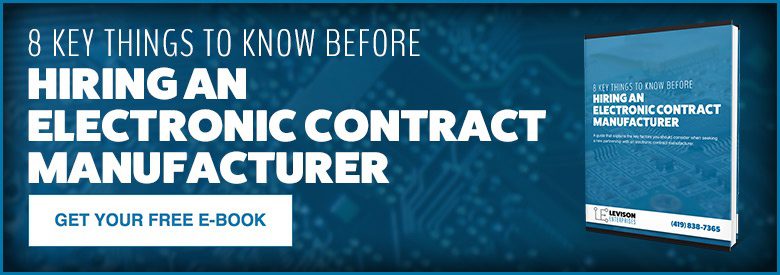Innovative Technologies and Trends in Electronic Manufacturing
Electronic manufacturing has never been a static industry, where the status quo is the norm. Technology is designed to push the boundaries to see what else we can do, how far we can reach, and what we can tweak to make the good even better. In electronic contract manufacturing, technology isn’t just advancing. Technology is speeding through the industry, gaining momentum with every new development, and building on what’s already been developed. For designers, manufacturers, and consumers, this is exciting. Efficiency, quality, and innovation will continue to grow, and we have the opportunity to be there and participate as it happens. The future is being shaped by the advancements of today.
Industry 4.0
The Fourth Industrial Revolution, known more commonly as Industry 4.0, is transforming traditional manufacturing processes. Electronic contract manufacturers are seeing how smart technology and digital system integration are changing how electronic devices are made. Automation, real-time information, data exchange, and interconnectivity are making electronic manufacturing more efficient and adaptable, and this is allowing manufacturers to respond to new demands from customers and consumers.
Additive Manufacturing
Additive manufacturing, also known as 3D printing, has revolutionized the prototyping phase in electronic manufacturing. Developing a working prototype has always been an important stage of device development and manufacturing, but in the past, this was a slower phase of production that added to the overall costs.
With additive manufacturing, electronic manufacturing can focus on rapid prototyping, which reduces the development phase of the production process and saves money as well as time. Advanced 3D printing facilitates the creation of even the most complex and customized components, which enables greater design opportunities and allows developers to quickly make necessary changes needed for improved design and function. As this technology continues to lead, the possibilities for advanced devices grows exponentially.

Artificial Intelligence
AI isn’t new to electronic manufacturing, but as AI continues to evolve, the industry continues to transform. AI can optimize processes to improve both quality and efficiency and can be used at every stage of product development and manufacturing. AI can help predict demand and optimize inventory levels so that demand can be met without delay.
AI can improve initial designs by analyzing data, which leads to more innovative products. Predictive maintenance powered by AI can reduce downtime by anticipating repairs, which prevents interruptions in production. Machine learning can adjust settings in real time, based on analysis of the process, which optimizes production runs and streamlines production. Accuracy and speed are far superior to human capabilities, meaning that more high-quality products make it to market. While it is still important to have skilled electronic manufacturers overseeing and controlling the process, AI certainly has its place.
Robotics
Human error has always been a concern in electronic manufacturing, and even the best training and most comprehensive quality checks can’t completely eliminate human error from the manufacturing process.
Implementing automation through robotics into the manufacturing process has addressed this issue. Electronic manufacturers can get more consistent products more efficiently when relying on automation to assemble electronic components, perform testing and quality checks, and handle packaging and shipping. By implementing this robotic automation, electronic manufacturing is more efficient, and manufacturers can better scale their operations to meet customer demand. Using robotic automation can help produce the smaller, flexible, and more customized components that customers want.
Sustainable Manufacturing
The demand for “green” manufacturing and environmentally friendly products is not abating. Electronic manufacturers know that many clients want to ensure their customers that they are committed to sustainable practices.
For most electronic manufacturers, this means using eco-friendly or recycled materials, taking steps to reduce energy consumption, and reducing waste. Electronic manufacturers can further demonstrate their commitment to sustainable manufacturing by working with suppliers who are also dedicated to sustainable practices, including sourcing materials and product distribution. Organic electronics use carbon-based compounds to create components that are not only flexible and lightweight, but can even be biodegradable, making them ideal for sustainable practices.
Product lifecycle management is another place where electronic manufacturers can demonstrate their sustainability. A focus on products that can be disassembled, repaired, and recycled promotes a better approach than “disposable” electronics that serve no purpose after they become obsolete.
What Impact Can We Expect on the Industry from these Innovations?
Electronic manufacturing plays an important role in how these innovations make it from concept to market. The future of technology is shaped by how efficiently and effectively ECMs can make these advancements a reality. In order to keep up with the demand from these new concepts, electronic manufacturing companies need to be sure that their workforce is continuously upskilled and trained to adapt to the new technologies and manufacturing processes.
Technical skills like programming, automation, and data analysis need to be consistently honed through in-house workshops, outsourced training, and updated certifications. In addition, electronic manufacturers need to keep their facility and equipment up-to-date and ready for the new demands that may be placed on it.
Innovations in technology will not ever slow down. In electronic contract manufacturing, the challenge comes with implementing these visions in an efficient and effective manner that ultimately provides value to the user.
As users see what technology can do, they will be looking to the manufacturers to get those products in their hands quickly. Partnering with an electronic contract manufacturer committed to a highly trained team working with cutting edge equipment is the best way to make these innovations possible. Levison Enterprises can help. Contact us today for a quote on your next project.
Start Your Quote Now!